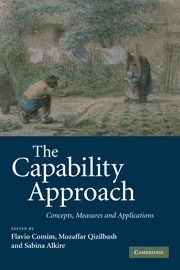Book contents
- Frontmatter
- Contents
- List of figures
- List of tables
- List of contributors
- List of acronyms
- Acknowledgements
- Introduction
- 1 Using the capability approach: prospective and evaluative analyses
- PART I Concepts
- PART II Measures
- PART III Applications
- 12 Democracy, decentralisation and access to basic services: an elaboration on Sen's capability approach
- 13 Reinforcing households' capabilities as a way to reduce vulnerability and prevent poverty in equitable terms
- 14 Capabilities over the lifecourse: at what age does poverty damage most?
- 15 Social policy and the ability to appear in public without shame: Some lessons from a food relief programme in Kinshasa
- 16 The capability approach and gendered education: some issues of operationalisation in the context of the HIV/AIDs epidemic in South Africa
- 17 Women and poverty in Mozambique: is there a gender bias in capabilities, employment conditions and living standards?
- 18 From the quantity to the quality of employment: an application of the capability approach to the Chilean labour market
- Index
- References
12 - Democracy, decentralisation and access to basic services: an elaboration on Sen's capability approach
Published online by Cambridge University Press: 22 September 2009
- Frontmatter
- Contents
- List of figures
- List of tables
- List of contributors
- List of acronyms
- Acknowledgements
- Introduction
- 1 Using the capability approach: prospective and evaluative analyses
- PART I Concepts
- PART II Measures
- PART III Applications
- 12 Democracy, decentralisation and access to basic services: an elaboration on Sen's capability approach
- 13 Reinforcing households' capabilities as a way to reduce vulnerability and prevent poverty in equitable terms
- 14 Capabilities over the lifecourse: at what age does poverty damage most?
- 15 Social policy and the ability to appear in public without shame: Some lessons from a food relief programme in Kinshasa
- 16 The capability approach and gendered education: some issues of operationalisation in the context of the HIV/AIDs epidemic in South Africa
- 17 Women and poverty in Mozambique: is there a gender bias in capabilities, employment conditions and living standards?
- 18 From the quantity to the quality of employment: an application of the capability approach to the Chilean labour market
- Index
- References
Summary
Introduction
Sen (2000) suggests that there are three arguments in favour of democratic political freedoms and civil rights: their direct importance for basic capabilities, including that of political and social participation; their instrumental role in enhancing the hearing the people get, including their claim to economic needs; and their constructive role in the conceptualisation of the needs. We suggest that the constructive role can be easily subverted by the conspiracy of silence about issues which are central to transforming the lives of the poor. The instrumental role of enhancing the hearing of people can also be effectively blunted if the hearing merely leads to populist rhetoric, and government spending plans to deliver services relevant to the poor, without actual delivery of quality services. The conceptualisation of their needs is more often carried out by well-intentioned, well-educated bureaucrats, neither fully sharing nor understanding the life experiences of the poor, functioning through vertically operated sectoral line ministries.
Thus, while national democracy offers much potential or scope for articulating the needs of the poor for basic social services, in such an environment the potential for the poor to enhance their capabilites is rarely realised except in a highly distorted manner. However, deep democratic decentralisation creates the basis for participation, the collective voicing of needs and collective action to force the government to deliver services effectively.
Sen recognises that there is a danger of overselling the effectiveness of democracy.
Information
- Type
- Chapter
- Information
- The Capability ApproachConcepts, Measures and Applications, pp. 385 - 420Publisher: Cambridge University PressPrint publication year: 2008
References
Accessibility standard: Unknown
Why this information is here
This section outlines the accessibility features of this content - including support for screen readers, full keyboard navigation and high-contrast display options. This may not be relevant for you.Accessibility Information
- 10
- Cited by
